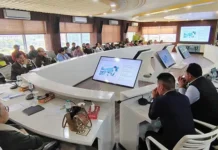[ Bengia Ajum ]
ITANAGAR, 6 Sep: The state government has issued a fresh notification in the Arunachal Pradesh gazette for issuance of scheduled tribe (ST) certificates to the indigenous tribes of Arunachal Pradesh, as notified under the Constitution (Scheduled Tribes) Order, 1950.
Various aspects, including eligibility criteria, address proof, identity proof, verification, constitution of verification/recommending committees, etc, have been mentioned in the notification.
Some important modifications have been made in the new notification. The copy of this new notification was shared for the first time on Tuesday in the state assembly.
Earlier, the AAPSU, while raising concern over ST certificates being given to children born to APST mothers and non-APST fathers had demanded that a law be enacted to stop such illegal practice. The deputy commissioners concerned will constitute recommendation and verification committees for issuing ST certificates. The role of the committees for every village and town will be to make recommendations in respect of applications for issuance of ST certificates, and to carry out verification of the cases recommended by the recommending committees.
In the rural areas, the recommending committees will comprise village head/gaon burah, member of the gram panchayat from which the applicant hails, and member from the apex CBO of that APST community of which the certificate is applied for.
In the urban areas, the recommending committee members are circle officers and members of the local municipalities where the applicants reside, and members of the apex CBO of that APST community of which the certificate is applied for. After passing through the recommendation committee, the applicants will have to again get a verified application from a verification committee.
In the rural areas, circle officers and officers-in-charge of the local police stations/ZPM concerned will be members of the verification committees, while in the urban areas, EACs and officers-in-charge of the local police station concerned will be members.
The recommending committee and the verification committee shall be constituted by the deputy commissioner of the district concerned, with instructions to hold meeting of the committees at least once a week in the case of the recommending committee, and fortnightly in the case of the verification committee, so as to strictly comply with the timeline.
The notification also mentions the procedures to be followed by the recommending and the verification committees while looking into the applications.
The recommending committee shall consider the applications received, and has to satisfy itself of the genuineness of the claims made by the applicants. The cases recommended by the recommending committee shall be formally submitted to the head of the verification committee concerned.
For the purpose of considering and disposing of the applications received, the recommending committee shall give a hearing to the applications received in batches, once a week. For this purpose, a public notice, giving particulars of applications to be heard and date, time and place of hearing shall be issued in advance, calling upon the members of the public to file objections, if any.
During such hearing, anyone who wants to raise objection to an application for an APST certificate of applicant’s father, or of any relative of the applicant showing direct blood relation with the applicant from the paternal side shall be allowed to do so, and shall be given the opportunity of furnishing evidence in support of such objection.
For the purpose of verifying the applications recommended by the recommending committee, the verification committee shall carry out its own verification and, after such verification, shall issue a public notice once in two weeks, mentioning the particulars of the applicants verified by the verification committee and inviting objection thereto.
If any objection is received, the verification committee shall give a hearing to the applicant and the party/parties who file such objection and dispose of such objections through reasoned speaking order.
If the certificate issuing authority is satisfied that a ST certificate has been obtained by any person by furnishing false information or by misrepresenting any fact or by suppressing any material information or by producing any document which is an act of forgery, it may cancel, impound or revoke such certificate. On receipt of a complaint or proceeding suo motu, the certificate issuing authority shall hold a preliminary inquiry by itself or by any officer above the rank of inspector of the Arunachal Pradesh Police.
Further, the certificate issuing authority shall then issue a notice to the certificate holder to show cause within 15 days, or within such a period as it may think fit, as to why the certificate issued in his favour shall not be cancelled, impounded or revoked on the grounds stated in the notice.
Speaking to this daily, an official of the SJETA department informed that most of the recommendations given by civil society bodies, in particular the AAPSU, has been incorporated in this notification.
“This is a sincere attempt to ensure that the process to get an ST certificate is made strict, so that no one uses fake documents to obtain an ST certificate,” the official added.


